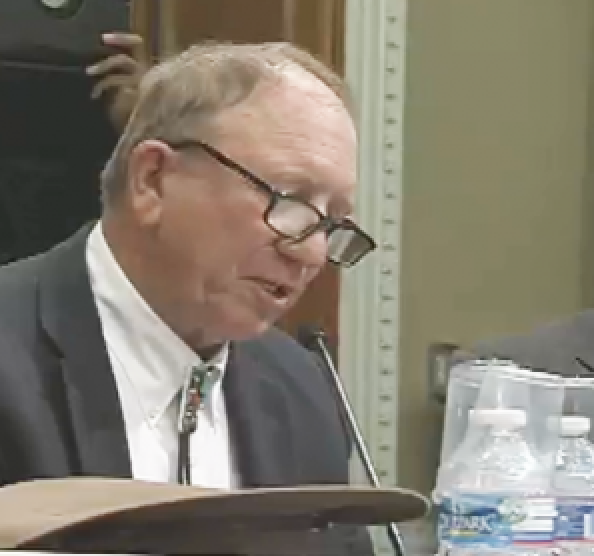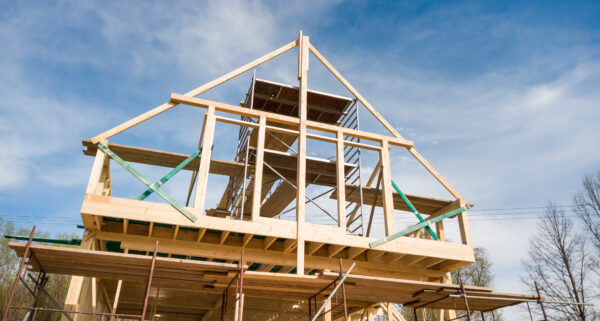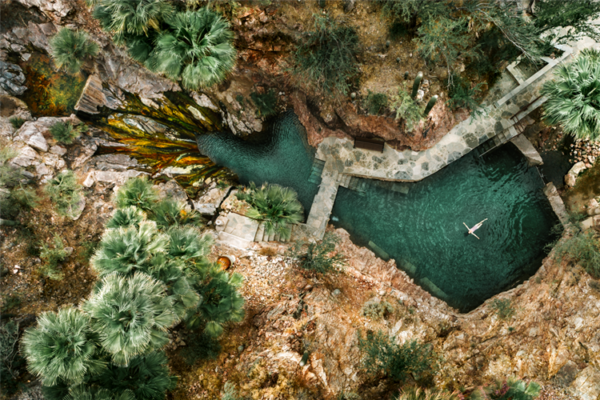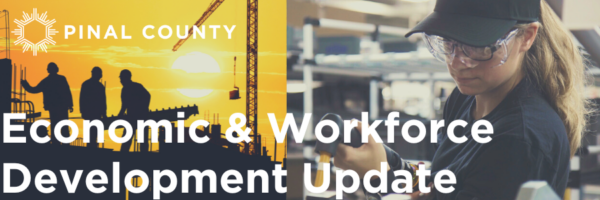By Adam Gaub | Casa Grande Dispatch
March 23, 2013
(See RLGR same-day coverage: Gosar takes on opponents in aggressive defense of land exchange bill for Resolution Copper)
Speaking before the U.S. House Energy and Minerals Subcommittee in Washington on Thursday, Pinal County Board of Supervisors Chairman Steve Miller pressed the legislators for action on a land swap that he said would provide thousands of new jobs and billions in new revenues.
Up for discussion since it was originally proposed in 2005, a land swap that would allow Rio Tinto Group subsidiary Resolution Copper the rights to begin copper mining on national forest land near Superior is being pushed again in the current Congress by Republican Rep. Paul Gosar and Democratic Rep. Ann Kirkpatrick. Democratic Rep. Raul Grijalva is the only member of the Arizona congressional delegation to oppose the bill.
“Here we go again,” Grijalva said during Thursday’s hearing. “This legislation is a deception … and I think there is a rush for this legislation because there is an erosion of local support.”
Not so, said Gosar, who submitted into the record the names of the plethora of government agencies that had approved resolutions of support for the project, including the bipartisan Pinal and Gila County Boards of Supervisors.
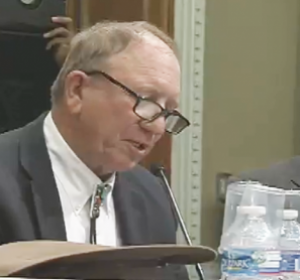
The bill for the land swap was passed out of the House last year but died in the Senate.
Gosar, who helped this year’s bill (HB 687) pass successfully out of the House Energy and Minerals Subcommittee on Thursday, believes this time must be different.
“This legislation has national security implications,” Gosar said. “The U.S. imports nearly 30 percent of its copper. This project would provide nearly 25 percent of the current U.S. demand.”
It was on grounds of national security that Grijalva said the project was not good for the U.S., making a claim that Rio Tinto subsidiaries had an active role in uranium mining that was going to Iran.
Kirkpatrick, who was heavily dependent upon the support of Native American com- munities in northern Arizona in winning back her seat in a hard-fought race last fall with Republican Jonathan Paton, walked a more careful line in her support for the project.
“There are pros and cons to this legislation and land exchange,” she said in testimony Thursday. “There is a way to work together and use the legislative process to bring… a diversified and stable economy to this region.”
Miller, on the other hand, was more blunt in his assessment of the need for the project.
“The citizens of Pinal County need more high-paying jobs,” he said. “Resolution Cop- per will put over 1,400 people in good, high-paying jobs… and will create even more indirect jobs. The mine will yield more than $16 billion in new revenues for the federal government and last (time) I checked, you could use a few billion around here.”
Miller said support for the project, from the congressional level on down, is widespread.
“The vast majority of residents of Pinal County… support this exchange and this mine,” he said.
“Nowhere is this support stronger than in the town of Superior.”
The politics of that town, however, are a bit more complex than testimony may
seem. Superior Councilwoman Kiki Peralta was also in Washington Thursday, testifying before the same committee about the town’s recent resolution passed against the mining project.
Peralta listed concerns about possible damage to the environment — including the water and air quality in the area — that would result from the mining plan.
“Our county and congressional delegation is not listening,” Peralta said.
Gosar fired back, saying it was Peralta and her fellow council members who were not listening to their constituents, submitting as evidence a recall petition filed that very day against Peralta by Superior residents.
Transcript of Miller’s testimony:
District 3
Testimony of Chairman Steve Miller,
Pinal County Board of Supervisors
before the
United States House of Representatives
Subcommittee on Energy and Mineral Resources
concerning
HR 687, Southeast Arizona Land Exchange and Conservation Act of 2013
March 21, 2013
Mr. Chairman and Members of the Subcommittee:
My name is Steve Miller. I serve as the Chairman of the Pinal County Board of Supervisors. I appreciate the opportunity to testify before you today, and would like to personally thank Congressman Paul Gosar for inviting me to testify. I would also like to thank Congresswoman Ann Kirkpatrick for her leadership on the issue before us today.
I was born in Arizona and have lived in Pinal County for almost 42 years. During that time, I’ve been through a lot of ups and downs in our community. As a husband, father, and grandfather, economic and community issues drove me to get involved in public and community service. Sure, I had my livelihood as a builder and truss manufacturer to consider, but I have always known people are what matter and few issues today are as important to the people of this County as this legislation and the jobs that will be created by the development of the Resolution Copper Mine.
I am fortunate to serve with some great leaders and I must acknowledge my colleagues on the Pinal County Board of Supervisors, especially Supervisor Pete Rios. Pete also hoped to testify here today, but could not be here. He has been an ardent supporter of the Resolution Copper Mining project from the days when he served in the Arizona State Senate to now.
The Pinal County Board of Supervisors, made up of Republicans and Democrats, just unanimously passed a resolution supporting HR 687. The vast majority of residents of Pinal County support this land exchange and this mine. Nowhere is support stronger than with the citizens of Superior, Arizona where polling shows support of the mine exceeds 80%. Strong words of support were spoken at our Board meeting by Superiorites like fourth generation resident Mila Besich Lira who stated that Resolution Copper has been very generous and transparent with people in Superior and the entire mining triangle. She credited Resolution’s support of local schools for the exponential rise in elementary school math scores and the success local Superior schools have had in competitions with schools throughout the southwest.
Let me tell you a little about Pinal County. We are right in the middle of the State between Arizona’s two largest counties – Maricopa to the north and Pima to the south. Like many of the counties in Arizona, we have a large geographic footprint – just a little larger than Connecticut. Our population has exploded from 60,000 in 1965 to more than 375,000. We need high quality, good paying jobs for our citizens today and into the future. Passage of this bill will help create those jobs.
Pinal County is not only large, but also diverse. The western part of the County, which I represent, is mostly low desert where irrigated farming has dominated over the years. The eastern part of the County is mountainous with elevations as high as 6,000 feet. It is home to what we’ve called the “copper triangle” – an area known for its long history as a copper mining region.
While I may be new to the Board of Supervisors, I’m not new to Pinal County and I’m very familiar with this legislation and the proposed mine. Mr. Chairman and Members, you need to understand the mining operation being proposed by Resolution Copper looks very different than the standard open pit mine. Based upon the County’s long‐standing working relationship with Resolution Copper, we believe this project is going to be one of the most environmentally‐sensitive mines in the nation…even the world. On behalf of our citizens, the Board will hold Resolution to the highest standard of environmental stewardship; and based on their actions so far, it is clear to me they intend to hold themselves to the same standard.
Let me explain what I see as evidence of Resolution Copper’s commitment to the environment. First, the legislation being considered today is the result of extensive consultation between Resolution Copper, federal agencies, and various non‐governmental organizations like The Nature Conservancy and the Audubon Society to find the best lands to exchange for the Oak Flat Campground. The federal government is the overwhelming beneficiary of this lands package.
For example, one parcel in Pinal County the federal government would receive through passage of this bill is known as the 7B Ranch – 3,050 acres of ranch land that covers seven miles on both sides of the San Pedro River. Resolution Copper has already put it under the management of the Nature Conservancy, and has additionally stepped up to the plate and, at its own expense, addressed the huge problem of illegal dumping on this otherwise pristine piece of property. Actions speak louder than words. Resolution Copper set a high standard for others to follow.
Resolution Copper’s actions also speak loudly in Superior, Arizona. It took over the nearly century‐old Magma Mine site in Superior, which required an extensive environmental cleanup. Resolution Copper was not obligated to complete cleanup for decades, but decided to begin the $50 million reclamation. Today, that cleanup is over 70 percent complete. These actions will ensure a safer, cleaner and healthier environment for the residents of Superior. Resolution Copper knows what it takes to be a good corporate citizen and a good community partner. They are helping improve Superior schools, send high school graduates to college, make it possible for younger kids to play little league on a field with grass, provide funding for community programs such as Superior’s signature event , Apache Leap Mining Festival, and provide much needed support for the fire and police departments. They understand that Superior is their home and the home to many of their current and future employees.
Let me say something more about economic growth. The citizens of Pinal County need more high‐ quality, good paying jobs. Our unemployment rate is about eight percent. The unemployment rate on our Indian reservations is more than triple that number. The Resolution Copper project will put over 1,400 people into excellent jobs – direct jobs as a result of the passage of this legislation. It will create thousands more indirect jobs. Combined, these jobs have the potential to create more than $60 billion in economic benefit over the life of the mine.
This project also benefits the public sector beyond the lands the US Government will receive. The mine will yield more than $16 billion in new revenue to the federal government. Last I checked, you could use a few billion dollars. Back in Arizona, the state, county and local governments stand to receive another $2 billion in revenues. It has been said by many others, far better than I can say it, but this bill is a true stimulus bill that doesn’t cost taxpayers one dime. By the way, dimes are currently made with 91% copper.
As an elected official, my responsibility is to improve the quality of life for my constituents. I came here today to urge you to join me, and the citizens of Pinal County, in support of this land exchange. I ask you to pass HR 687 immediately. The residents of Pinal County and the State of Arizona are looking to you for action.
Mr. Chairman, thank you for the honor of appearing before your subcommittee. I look forward to answering any questions the Subcommittee may have.

